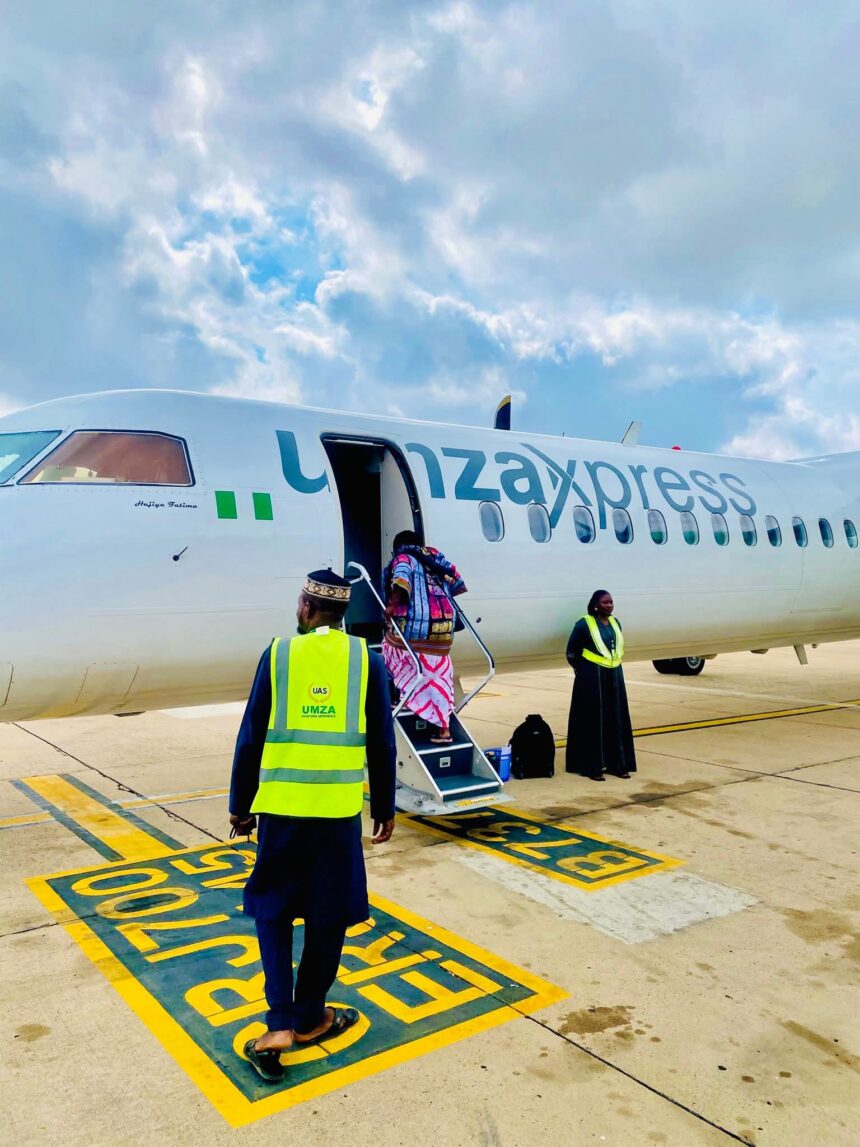In a move that could alter the dynamics of Nigeria’s domestic aviation market, Abuja-based UMZA Aviation Services Ltd. (UMZA Air) has announced that it will soon begin flights between Ilorin and Abuja.
“Ilorin, we’re coming your way. UMZA Air is bringing unmatched flight services with comfort, care, and one-time performance you can trust,” the airline declared in a statement.
This move signals both an expansion of Nigeria’s domestic air network and a deepening reliance on technology to modernize operations and improve passenger experience.
The carrier positions itself as a customer-centric operator focused on reducing delays and elevating passenger experience.
A New Route Launch in a Challenging Climate
UMZA Air’s planned Ilorin–Abuja route enters an already tense market. One-way fares between the two cities have soared in recent months, reports indicate prices ranging from N250,000 to N380,000 depending on the day of travel.
For example, a one-way trip from Ilorin to Abuja has been quoted at N250,000 to N290,000, a steep rise from the prior average fare of N65,000–N100,000.
Adding further pressure, Overland Airways, currently the dominant operator on the Ilorin route, has come under fire from consumer groups.
In August 2025, civil society organisations petitioned the Federal Competition and Consumer Protection Commission (FCCPC), accusing Overland of discriminatory pricing on the Lagos–Ilorin–Abuja corridor.
Petitioners claimed that Overland’s monopoly at Ilorin’s Tunde Idiagbon International Airport enables it to inflate fares for Ilorin passengers.
UMZA will need to offer competitive scheduling, pricing discipline, and reliability if it is to win travelers frustrated with existing fare structures.
UMZA Air: Ambitions, Fleet, and Market Position
UMZA was formally incorporated around 2019 and operates under the marketing name Umza Air. The carrier is said to have, as of recent reporting, a fleet of three Dash 8-400 (Q400) turboprop aircraft; these are reportedly operated under a partnership with Aero Contractors.
On its website, UMZA lists six domestic destinations: Abuja, Lagos, Maiduguri, Kano, Sokoto, and Yola. The Ilorin route announcement thus signifies a first foray into Kwara State for the airline.
While UMZA says it places emphasis on safety, system efficiency, and customer satisfaction, its capacity to scale, maintain aircraft, and manage operational disruptions will be key tests.
Notably, UMZA has already attempted to extend its credibility via government contracts. It was among the airlines cleared to support Nigeria’s 2025 Hajj airlift operation.
Although UMZA initially objected to the terms, citing concerns over allocations and payment currency, it ultimately carried out its Hajj flights.
The Competitive Skies
UMZA’s challenge lies in standing out in an increasingly crowded field. Established carriers like Air Peace, Ibom Air, Max Air, Green Africa, ValueJet, and Overland Airways already dominate key domestic corridors.
Most are modernizing fleets and adopting digital ticketing systems, but few have successfully expanded into secondary hubs like Ilorin.
Competition also extends beyond pricing. Nigerian travelers increasingly value reliability, customer engagement, and digital convenience.
Airlines that can integrate AI-driven scheduling, predictive maintenance, and customer data analytics into their operations are likely to gain a competitive edge.
What Passengers Want — And What It Will Take
For travelers between Ilorin and Abuja, the entry of a new operator could bring relief.
UMZA claims it will “minimize delays and provide a seamless travel experience.”
In its announcement, the airline pledged to exceed expectations and “innovate to meet changing needs.”
To deliver on that promise, UMZA must address Nigeria’s broader aviation challenges: volatile fuel pricing, currency devaluation, regulatory pressures, and infrastructure constraints at secondary airports like Ilorin.
It must also match or beat the existing price-perceived value that customers expect, especially in a corridor where fares are already deemed unjustifiably high by many.
As UMZA Air prepares for takeoff in Ilorin, the market will be watching whether it can deliver both affordability and operational reliability, and whether it can catalyze more competitive pressure on legacy operators.
Talking Point
UMZA Air’s planned Ilorin–Abuja route is a timely and potentially transformative move for Nigeria’s domestic aviation market, especially amid mounting public frustration over exorbitant fares and limited competition.
The carrier’s entry could break other Airways’ dominance on the route and introduce long-needed pricing balance, assuming UMZA upholds its promises of efficiency, punctuality, and customer satisfaction.
Yet, the airline’s success will depend less on lofty declarations and more on consistent delivery in an industry plagued by volatile fuel costs, maintenance delays, and regulatory bottlenecks.
If UMZA can pair its customer-centric vision with operational discipline, it may not only redefine air travel for Ilorin-bound passengers but also set a new benchmark for service quality and accountability in Nigeria’s struggling aviation sector.






